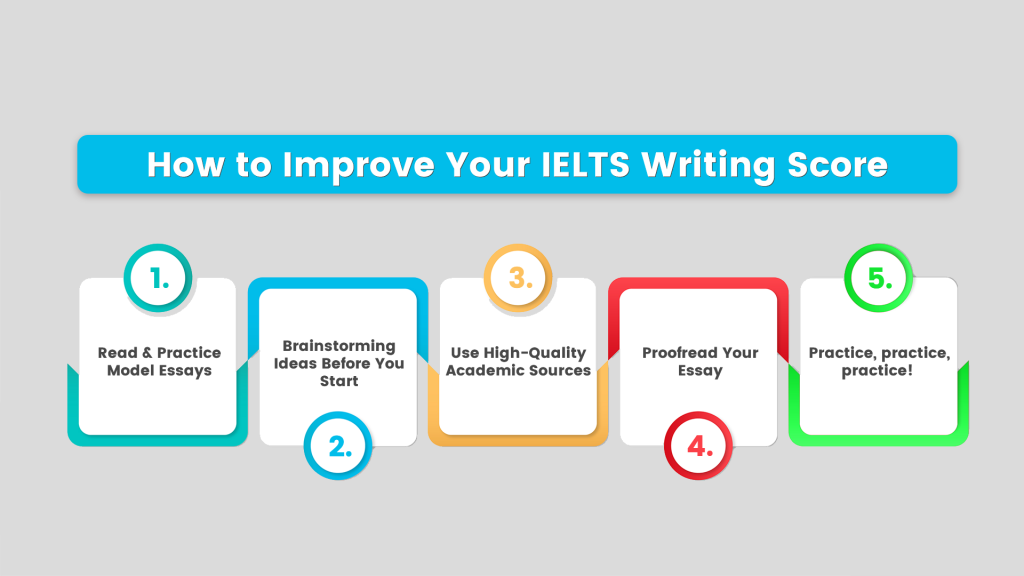Your cart is currently empty!
Category: IELTS Writing task 2 samples (8 band)
-

Writing for IELTS: A Comprehensive Guide
In this comprehensive guide, we’ll go over all aspects of the IELTS writing test. We’ll discuss the different types of essays you’ll be asked to write, and provide step-by-step instructions for how to write each one. Plus, we’ll give you tips and advice for staying motivated and overcoming writers’ block.
So whether you’re a beginner or an experienced IELTS writer, this guide has something for you. Let’s get started!
What Is the IELTS Writing Test?
The IELTS Writing Test is a test of your ability to write in English. You will be asked to write two essays: one Task 1 and one Task 2.
Task 1 is a letter For general training students and report for academic students . Task 2 is an essay on a more challenging topic.
The test is designed to assess your ability to communicate information, ideas, and arguments in writing. It is also designed to assess your ability to respond to questions and criticism about your writing.
Why Is Writing Important for IELTS?
When you’re taking the IELTS test, writing is one of the sections that counts for your final score. That’s why it’s so important to make sure that you spend enough time practicing and preparing for this section.
The good news is that there are a lot of resources out there to help you improve your writing skills. In fact, we have an entire section on our website dedicated to helping IELTS students improve their essay writing.
So why is writing so important for IELTS? Well, it’s not just about getting a good score on the test. Writing is a critical skill that you’ll need in academic and professional settings. That’s why it’s important to practice and develop your skills so that you can perform your best on test day.
How to Prepare for the IELTS Writing Test

In order to ace the IELTS writing test, you need to practice, practice, practice. And that means working on your writing skills on a regular basis.
But it’s not just about practicing the actual writing task. You also need to be familiar with the types of questions that will be asked. So make sure you spend some time reading the IELTS test instructions carefully.
Equally important is knowing what the marking criteria are. So take a look at the marking grid and make sure you understand how your writing will be graded.
By following these tips, you’ll be well on your way to scoring high on the IELTS writing test!
What Are the Different Types of IELTS Writing Tasks?
In the IELTS writing test, there are two tasks: a task 1 and a task 2.
Task 1 is a report for academic training students , and it usually asks for information about a graph or table. In this task, you need to give a concise summary of the data, as well as describe any trends that you notice.
Task 1 for general training is letter writing and it usually asks to write a situation based letter may be to a friend, manager or boss. The relation with the person to whom you are writing the letter will decide the tone whether it will be a formal or an informal letter
Task 2 is an essay, and it asks for your opinion on a given topic. In this task, you need to develop your argument and provide evidence to support your point of view.
How to Plan and Structure Your IELTS Writing Task
Ok, so you’ve got your task, and now it’s time to plan and structure your essay. Here are a few tips to help you out:
- Plan your essay before you start writing. This means thinking about the main points you want to make and organizing them in a logical order.
- Start with a strong introduction that clearly states your position on the topic.
- Develop your argument using clear and concise points, making sure to support your points with evidence from the text.
- Use a variety of sentence structures to keep your writing interesting and engaging.
- Write a strong conclusion that sums up your argument and leaves the reader with something to think about.
How to Write an IELTS Essay
Now that we’ve covered the basics of IELTS writing, let’s take a look at how to actually write an essay. The best way to learn is by example, so let’s take a look at a sample question and see how we might go about answering it.
The question is: Some people think that the way to be successful is to make as much money as possible. Do you agree or disagree?
When you’re writing your essay, make sure to include your opinion on the matter. You don’t have to agree or disagree with the statement, but you should state your position either way. Here’s an example of how we might write this essay:
I think that the way to be successful is to find something that you’re passionate about and put your heart and soul into it. Money is important, but it shouldn’t be the only thing that drives you. There are many people who are successful without having a lot of money, and I think that’s because they’re doing something they love.
How to Write an IELTS Letter
When it comes to writing letters for IELTS, it’s important to remember that there’s a specific format you need to follow.
The general structure of a letter is usually:
- salutation – Dear sir/mam/john
- Opening paragraph
- Detailing paragraph(s)
- Closing sentence
- Signature
Within each of these sections, there are specific things you need to include. Let’s take a closer look. The opening paragraph should introduce the topic of your letter, and the main paragraph(s) should provide more detail. The closing sentence should thank the recipient for their time, and the signature should be your name followed by your signature.
IELTS Writing Task 1 – Academic
The 1st Task of the Academic Writing Module asks you to describe and summarise some information presented in a visual format (chart, table, graph or diagram) in about 20 minutes. Students, for this task, must write at least 150 words.
The Academic Writing Task 1 can be of the following types:
Types of Diagram What does it mean? Line Graph Shows Trend Bar Chart Shows Comparison Pie Chart Shows Contribution Table show any of the functions mentioned above Process Diagram or Flow Chart Shows Stepwise information Picture or Map Shows image IELTS Writing Task 1 Academic Answer Structure
For a high band score in Academic Writing Task 1, the students must structure their answers. First, we will look at a high band score answer structure for the first four categories mentioned above like Line Graph, Bar Chart, Pie Chart, & Table. Because the answer structure for a process or flow chart or a picture is different.
The students can structure their answers for the first four categories as below;
Paragraph Structure Opening Paragraph one paragraph consisting of 1 – 2 sentences explaining what you will describe. An Overview 1-2 Statements interpreting the key or significant features of the graph/map/process/picture Body The body structure may have a minimum of 2 paragraphs depending on the question asked, but they should not be more than 4. The students must answer the examiner’s demands in the body part. IELTS Writing Mistakes to Avoid
Are you preparing to take the IELTS Writing Exam? If so, you need to be aware of the most common mistakes people make.
One of the biggest mistakes is not paying attention to the task instructions. Make sure you read the question carefully and understand what’s being asked. Sometimes people try to be too clever and they end up writing something that’s completely irrelevant to the topic.
Another mistake is not organizing your thoughts properly. When you’re writing a paragraph, it’s important to have a clear idea of what you want to say and how you want to say it. Rambling on and on without any structure will only confuse the reader.
And finally, don’t forget to proofread your work! A lot of people make mistakes because they don’t bother to check their work for mistakes. This is a BIG mistake, because it can cost you marks in the final score.
Sample IELTS Writing Tasks
If you’re looking to improve your IELTS writing score, one of the best things you can do is practice. And what better way to practice than by working on sample tasks?
In this section, we’ve provided a range of sample tasks to help you get started. These tasks cover a variety of different topics, so you can get a feel for the different types of questions that come up in the test.
We’ve also included some tips and advice to help you start tackling these tasks. So don’t waste any time—get started today and see how much your score improves!
Conclusion
Congratulations on deciding to take the IELTS writing test! This document is designed to provide you with all the information you need to get a great score.
Inside, you will find:
- An introduction to the IELTS writing test
- The format of the writing test
- Advice on how to approach the task types
- Detailed guidance on how to generate ideas and write essays for each task type
- Sample answers to each task type
- Useful language for academic writing
- A glossary of terms
- Tips for improving your writing skills
You will also find a number of exercises to help you practice and improve your score. The more you practice, the better your score will be. Good luck!
[carousel_slide id=’16536′]
-

How to Improve Your IELTS Essay Score ?
You’ve just been given your IELTS essay score and it’s not what you were hoping for. Don’t worry, there are still a few things you can do to improve it quickly.
Here are a few tips to help you improve your IELTS essay score:
- Read the question carefully and make sure you understand it before you start writing.
- Make sure your essay is well organized and well written.
- Use strong, relevant examples to support your points.
- Make sure your grammar and spelling are correct.
- Proofread your essay carefully before submitting it.
- Practice, practice, practice! The more you write, the better your score will be.
- Get feedback from others and learn from their mistakes.
Follow these tips and you’ll see an improvement in your IELTS essay score in no time!
Introduction: What Is the IELTS Essay and Why Is It Important?
The IELTS essay is an important part of the IELTS exam. It’s your opportunity to show that you can communicate effectively in English. The essay is worth 25% of your total score, so it’s important to do well.
But don’t worry, you can improve your score quickly if you know what to do. Follow these simple tips, and you’ll be on your way to getting the score you need.
What Are the Main Criteria for the IELTS Essay?
When you’re writing your IELTS essay, there are three main criteria that your score will be based on:
- Task Achievement – how well you completed the task
- Coherence and Cohesion – how well your essay is written and how well it flows
- Lexical Resource – the range and accuracy of your vocabulary
- Grammatical Range And Accuracy – Using correct grammar and adding range of sentence structures.
How to Quickly Improve Your IELTS Essay Score
Tips, on the other hand, are an incredibly important and worthwhile component of this test. Tips are required to inform you of the most difficult and easiest sections of the paper. You can begin your preparation by following the instructions.
Overall, the guidelines give a foundation for the applicants’ preparatory path. It teaches them what to do and how to accomplish it. Let us now move on to tried and true ways for increasing your IELTS writing score.
Many tips are provided below to help you feel confident and at ease with the IELTS exam. It will provide you with information about the beginning and perfect structure of your answers in order for you to impress the examiners and obtain high scores.
Read the Statement thoroughly.
This is critical because if you don’t read accurately, you won’t be able to answer the questions precisely. All applicants must ensure a thorough reading the question. Dont miss to keep track of the keywords, so that you response to the task precisely. This will assist you in processing the meaning of the text. You will comprehend every aspect and become skilled at providing a response.Make a rough outline of the essay.
A basic framework makes it easier to conceive ideas and put them into action. This may appear to be an extra step, but if you have a clear sense of how to approach the issue, it will be quite easy to expand on that.The rough style allows you to easily and precisely transfer your ideas to paper. You can begin writing after first thinking and developing thoughts. It will quicken your writing rate and allow you to include all of the important details.
Make Use of a Variety of Linking Words
Linking words is the simplest basic and grammatically correct way to link ideas, sentences, or phrases in a piece of writing. You must show the examiner a variety of linking terms that are contextually suitable.
Watch out for misspelt words and grammar mistakes.
Nothing ruins an essay more than grammatical mistakes and misspelt words. You must have a keen eye to ensure that your sentences are free of grammatical and stylistic errors, and that your spellings are perfect.
Using Range in grammatical structures
Adding variety in grammatical structures showcase your flexibility in using the language. Using various structures like conditionals, clauses, complex structure, compound structures etcetera sophistically can take your band score in writing to 8.
Read Sample Essays and Get Feedback from expert
When you’re preparing for the IELTS test, it’s important to get feedback on your essays. That’s why we’ve included a few sample essays in this guide, as well as feedback from our expert team.
We’ve also highlighted some of the common mistakes people make when writing essays, so you can avoid them yourself. And lastly, we’ve included a few tips to help boost your essay score.
So what are you waiting for? Start reading!
Conclusion
Follow these simple steps to improve your IELTS essay score and get the result you need.
First of all, read the question carefully and make sure you understand what is being asked. Then, plan your essay carefully before you start writing, making sure you include all of the key points. Be clear and concise in your writing, and make sure your grammar and spelling are perfect. Finally, proofread your essay thoroughly before submitting it.
If you follow these steps, you’ll be able to improve your IELTS essay score quickly and easily.

